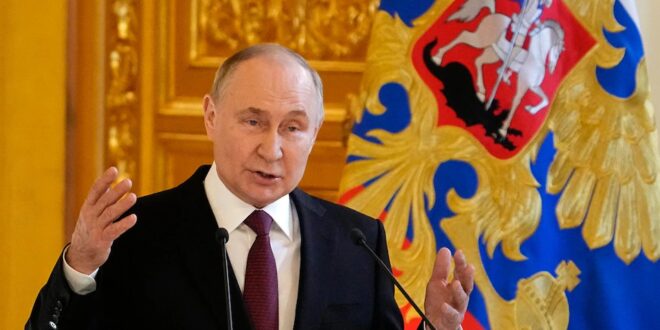We are still doing far too little to prepare for the eventuality that Russia is victorious in Ukraine
Now that Russian President Vladimir Putin has secured his historic fifth term in office, it is patently clear that he will devote his next six-year spell at the Kremlin to pursuing his paranoid obsession of confronting the West.
Having recorded a post-Soviet era record of winning nearly 88 per cent of the votes, Putin used his victory to remind Russians that they would never be intimidated by the West.
“No matter who or how much they want to intimidate us, no matter who or how much they want to suppress us, our will, our consciousness – no one has ever succeeded in anything like this in history,” he said. “It has not worked now and will not work in the future. Never.”
According to Putin’s narrative, he is fighting Western attempts to diminish Russia through a relentless effort to persuade countries, such as Ukraine, that previously fell under Moscow’s sphere of influence to join Nato and the European Union.
This means the 71-year-old Putin will feel fully justified in exploiting his massive election victory to continue pursuing his agenda of trying to rebuild Russia into a global superpower, even if it runs the risk of provoking a major conflict with the West.
The Russian president certainly did not shy away from the issue when asked a question about the possibility of becoming involved in a direct confrontation with the West during his post-election press conference.
“I think everything is possible in the modern world … it is clear to everyone that this will be one step away from a full-scale Third World War.”
Putin’s remarks vindicate recent comments made by Nato leaders warning that the full extent of the Russian leader’s territorial ambitions extend far beyond the confines of Ukraine.
The US president, Joe Biden, stated back in December that Putin is planning to attack a Nato country once he has finished in Ukraine, while in January Admiral Rob Bauer, the chair of Nato’s military committee, called on the alliance’s member states to be ready to fight an all-out war with Russia within the next 20 years.
Nothing Putin has said in the wake of his election success should disabuse anyone of the view that the Kremlin clearly means business in terms of escalating its confrontation with the West. It is an assessment, furthermore, that should serve as a wake-up call for Nato states like Britain that remain in a state of denial about the ability of their armed forces to meet the challenge the Kremlin’s bellicose mentality poses to European security.
This week’s warning, for example, by Kosovo’s prime minister Albin Kurti that Britain needs to send more troops to help prevent Russian-backed Serbian forces from invading his country is just the latest example of Moscow’s expansionist designs.
While ministers continue to insist that the UK military retains the means to keep the country secure, that is palpably not the view of highly-experienced former defence chiefs who, free from the restrictions of their former ranks, have laid bare the inadequacy of the Government’s efforts to equip the military for the very real challenge Putin presents.
In a paper published this week by the New Bletchley Network, such luminaries as Lord Robertson, the former New Labour defence secretary and Nato secretary-general, and Lord Sedwill, who served as national security adviser under Theresa May and Boris Johnson, publicly called on the Government to address the issue of rearmament with the seriousness it deserves.
“To be credible in deterrence terms, we need to prepare genuinely for war and communicate this to potential foes, Nato and allies, and particularly to the British public,” the paper warns. A top priority, moreover, should be to rebuild the Army which, at its current strength of around 75,000 – its smallest since the Napoleonic era – has been reduced “far below national critical mass”.
Coming from such distinguished and respected figures in our defence establishment as these, Downing Street would be well-advised to take heed of their sage counsel, instead of endlessly resorting to its tired refrain that it aims to increase defence expenditure to 2.5 per cent of GDP “when fiscal and economic circumstances allow”.
The same applies to our allies in Europe, where the distinct prospect of Donald Trump winning November’s presidential election has galvanised many European states into increasing their defence expenditure to meet Nato’s 2 per cent of GDP requirement.
While just three Nato countries met their Nato obligation in 2014, that figure is likely to rise to 19 this year. But that still leaves another 13 countries failing to pay their dues, an omission that will not be lost on Trump who, in his GB News interview with Nigel Farage this week, said he remained committed to Nato – so long as the Europeans pay their way.
It is quite remarkable that, with Putin now openly threatening Europe’s borders, and Trump questioning Nato’s future, there are still countries that remain unwilling to fulfil their defence responsibilities. If Putin’s re-election fails to stir them from their torpor, perhaps nothing will.
 Eurasia Press & News
Eurasia Press & News




